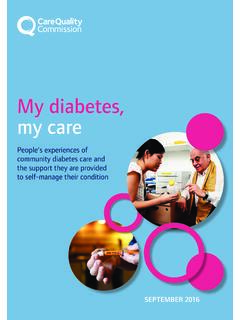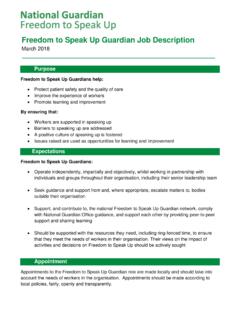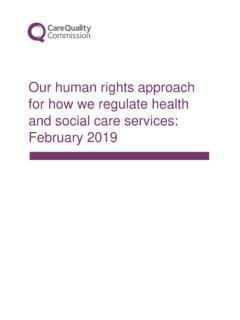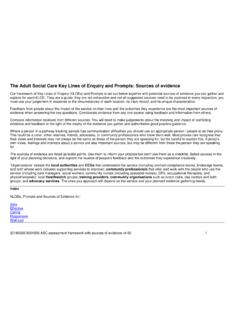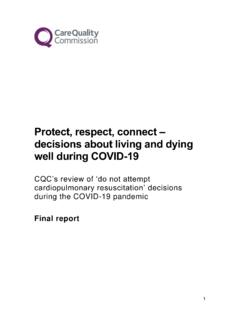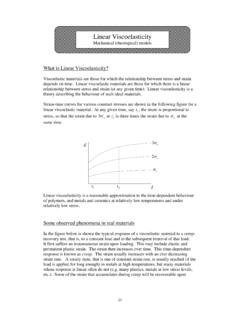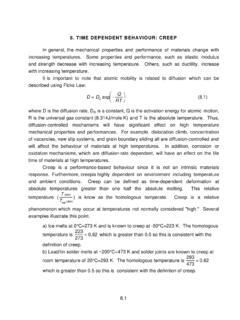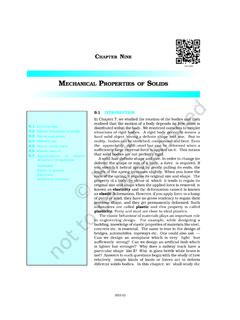Transcription of Brief guide: Positive behaviour support for people with ...
1 Page 1 of 4 20180705 900824 Brief guide : Positive behaviour support for people with behaviours that challenge v4, April 2017 Review date: April 2018 Brief guide : Positive Behavio Brief guide : Positive behaviour support for people with behaviours that challenge Context Positive behaviour support (PBS) is a person centred framework for providing long-term support to people with a learning disability, and/or autism, including those with mental health conditions, who have, or may be at risk of developing, behaviours that challenge.
2 It is a blend of person centred values and behavioural science and uses evidence to inform behaviour that challenges usually happens for a reason and maybe the person's only way of communicating an unmet need. PBS helps us understand the reason for the behaviour so we can better meet people 's needs, enhance their qualityof life and reduce the likelihood that the behaviour will happen. 1 Evidence required 1. Provider s strategy, policy and procedures for managing behaviour that challenges. 2. Care records to confirm people with behaviour that challenges have had a recent holistic assessment and an individualised behaviour support plan (or equivalent) which is reviewed regularly.
3 3. Observations or records of staff activity demonstrating: support for people to learn new skills, particularly those which could increase communication and enhance quality of life understanding of how to prevent behaviour that challenges, including making changes to the environment, a focus on skills development and individually designed support effective use of reactive strategies, including distraction, change to the environmnent and de-escalation minimum use of restrictive interventions appropriate de-briefing after any incidents.
4 4. Discussions with staff to assess their understanding of PBS and its impact and to check they receive appropriate supervision, with opportunities to reflect on practice. 5. Records of audits, monitoring, staff training and supervision. Reporting In the assessing of needs and planning of care section of effective describe the quality of the assessment and behaviour support plan (or equivalent) and whether they follow the PBS strategies outlined in appendix 1. In the best practice in treatment and care section of effective state whether the staff consistently apply effective proactive strategies to prevent behaviour that challenges (including teaching new skills) and if they apply the reactive strategies (including restrictive interventions) described in the behaviour support plan effectively and safely.
5 Also report whether there is a clinical audit programme to monitor the effectiveness of PBS. In the skilled staff to deliver care section of effective report whether the provider supports staff to implement PBS, through protected time, training and supervision. In the involvement of people in the care they receive section of caring comment on whether patients and families/carers have been given an opportunity to discuss and learn about PBS. In the good governance section of well-led comment on whether the provider monitors the attainment of specific objectives identified in PBS plans, such as people s increasing ability to express their feelings in non-challenging ways and reduction of restrictive interventions.
6 1 Centre for the Advancement of PBS, PBS key messages, January 2017 Page 2 of 4 20180705 900824 Brief guide : Positive behaviour support for people with behaviours that challenge v4, April 2017 Review date: April 2018 Policy position All providers must take account of the Department of Health s This states that services that support people whose needs and histories mean they are likely present with behaviours that challenge should use recovery-based approaches and delivery of care in accordance with the principles of Positive behavioural support .
7 This applies to all services that work with people with learning disabilities or autism who present with behaviour that challenges, as well as services for people who are elderly and confused who may become agitated. Providers should also act in line with NICE Guideline 103 and adopt this framework to anticipate and reduce violence and aggression and the use of restrictive interventions. CQC s position for the purpose of its inspections is that: Staff should have made a recent assessment of the person s behaviour and created a behaviour support plan (or equivalent) and those making assessments should be adequately trained and supervised.
8 Assessments should be individualised and holistic, and include a functional assessment of behaviour . Staff should be trained to avoid or minimise restrictive interventions, and in de-escalation techniques. The behaviour support plan (or equivalent) should state in detail all the interventions to change behaviour pro-actively and to manage behaviour reactively. The behaviour support plan (or equivalent) should include effective monitoring of behaviour and use the data gathered to aid its continued development.
9 Providers should have a transparent policy on the use of restrictive interventions, with an overarching restrictive intervention reduction programme. Where there are any incidents of physical restraint, the multidisciplinary team should conduct an immediate post-incident debrief, monitor and respond to ongoing risks, and contribute to internal and external reviews. In addition, chapter 26 of the Mental Health Act Code of Practice4 provides statutory guidance relevant for all patients receiving treatment for a mental disorder in a hospital and who are liable to present with behavioural disturbances, regardless of their detention status.
10 Providers should comply with the requirements of that guidance when managing challenging or disturbed behaviour . Link to regulations CQC should take action under: Regulation 9 when staff have not implemented effective behavioural support plans. Regulation 12 when staff have not assessed or managed the challenging behaviour effectively. Regulation 13 when staff have not taken reasonable steps to use the least-restrictive strategies to manage challenging behaviour . Regulation 17 when the provider has not audited and monitored the number of challenging behaviour incidents or other PBS plan outcomes.
